Diet soda even more harmful than usual?
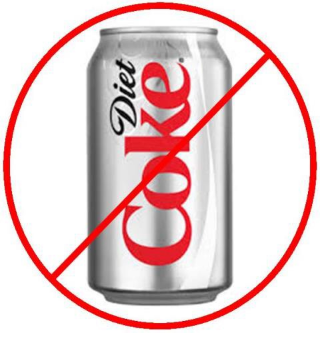
TL; DR:
- sugar substitutes (aspartame, stevia) can increase the insulinogenicity of the body, causing it to secrete more insulin per unit of glucose than it does without them (and this is the first step to insulin resistance)
- consumption of beverages with NW is associated with an even greater risk of diabetes, stroke and dementia than beverages with sugar
- but the negative role of gas in beverages is based on only one dubious study and is refuted by others
Sugar is evil. Its excess consumption increases the risk of obesity, hypertension, diabetes, and even Alzheimer's. And the way you get it is not so important - in juices, fresh juices, soda, honey or half a kilo of grapes - how much its daily amount, which WHO recommends to limit to 5-10% of calories (that is, 25-50 grams of sugar per day , based on the norm of 2000 kcal / day; however, WHO excludes fruits from this restriction, which I cannot agree with). For comparison, in a Pepsi jar with a volume of 0.33 l there is 41 g of sugar:
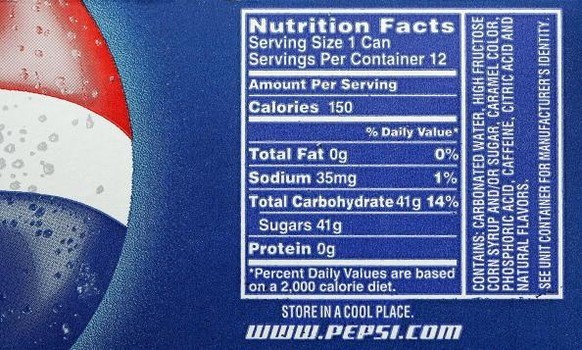
Based on this, many believe that diet soda - that is, with sugar substitutes instead of sugar - is much less harmful to health. But is it? Moreover, can it be even more harmful than usual - that is, it is associated with an even greater risk of diabetes, strokes and dementia? With full confidence to answer this question in the affirmative, I am not ready yet, but there are many reasons to think.
What kind? First, a large number of studies showing a correlation between the consumption of beverages with sugar substitutes (SZ) and an increased risk of developing various diseases. And although the correlation does not mean the existence of a causal link, it may indicate the possibility of its existence.
Secondly, evidence that sweeteners cause insulin release commensurate with sugar. And thirdly, the observation that even the smell or taste of food can shorten the life of a model animal - that is, if your body even thinks that you have eaten a lot of calories, then it can behave accordingly (for example, accelerating your aging - especially you are a fruit fly).
Initially, I was very skeptical about the potential relationship between NWS and the increased risk of stroke or dementia. It would seem, well, what could be so bad about them? Doses of the active substance are miserable, toxicity or serious side effects are absent, which has been proven many times. Yes, and they do a good thing - help people avoid sugar.
What is dangerous glucose, I thought? The fact that its excessive consumption causes insulin resistance and diabetes. Yes, and other negative effects of its use, including the acceleration of aging, are also tied to insulin and its signaling cascade , and in the vast majority of organisms - from yeast to humans . But the deeper I immersed myself in this topic, the more I began to suspect that the benefits of replacing glucose with NW may turn out to be illusory. Suspicions strengthened when I came across one study showing that NW, just like glucose, causes an insulin release. The graph shows that their insulin responses are similar:

And insulinogenicity in NW is even higher:
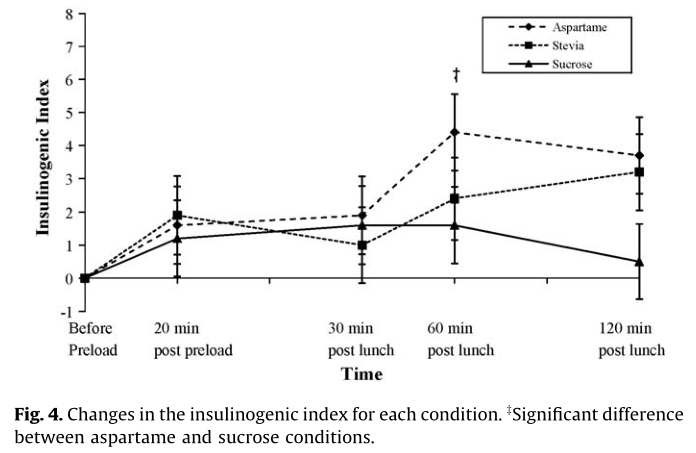
What is the insulin index ? Roughly speaking, this is an indicator of the volatility of your insulin and indirectly the efficiency of the pancreas . The higher it is, the more insulin you increase per unit increase in blood glucose.
In the above research about him write the following:
60 minutes after lunch, there was a significant difference in the insulin index (calculated by dividing the increase in plasma insulin level above the baseline by the increase in plasma glucose — that is, Δ insulin / Δ glucose for 30 minutes) between the aspartame and sucrose groups (p <0.05, see Figure 4). No other differences between groups were observed.
When people get less glucose / carbohydrate, their insulin response should be less. This is the meaning of the insulin index. In that study, all three groups were in identical conditions: participants came to the center in the morning, on an empty stomach, after at least 12 hours without food. The food was all eaten similar, with approximately the same BJU balance between the groups, except for the difference in sugar and NW (sugar gave an additional 200 kcal). What alerted me is that if people get less calories and glucose, and their insulin response is the same or even higher than those who received more calories, this is not good. Indeed, in fact, insulin resistance is the state when in order to lower the same level of glucose in the blood, a higher level of insulin is needed:
In an insulin resistant person, normal insulin levels do not have the desired effect on blood glucose levels. During the compensatory phase of insulin resistance, insulin levels are higher, and blood glucose levels still persist. If compensatory insulin secretion fails, the fasting or postprandial glucose concentration increases. In the end, if the glucose level remains elevated during the day, insulin resistance increases, compensatory insulin secretion stops working, and type 2 diabetes or latent autoimmune diabetes occurs.
...
The presence of insulin leads to some insulin resistance; each time a cell is exposed to insulin, the amount of GLUT4 (glucose receptors type 4) on the cell membrane decreases slightly. In the presence of higher than usual insulin levels (usually caused by insulin resistance), this down-regulation acts as a kind of positive feedback, increasing the need for insulin.
A source
On the one hand, such an effect from NW may seem quite natural. If they bind to taste receptors of glucose (after all, they taste sweet), then what prevents them from contacting those glucose receptors that are responsible for insulin release in pancreatic cells?
A rather logical, at first glance, conclusion, alas, turns out to be false. To make sure of this, it is enough to recall fructose, which is even sweeter than glucose, but insulin release does not provoke. However, this does not mean that it is more useful than glucose: studies say that increased consumption of fructose also leads to insulin resistance and obesity.
At the same time, some NWs actually act at the level of insulinogenic pancreatic cells , either by causing insulin release on their own, or by increasing its size in response to glucose (that is, increasing the insulinogenic index of the body - just like in that study above!). Here are the interesting results of a 1998 study :
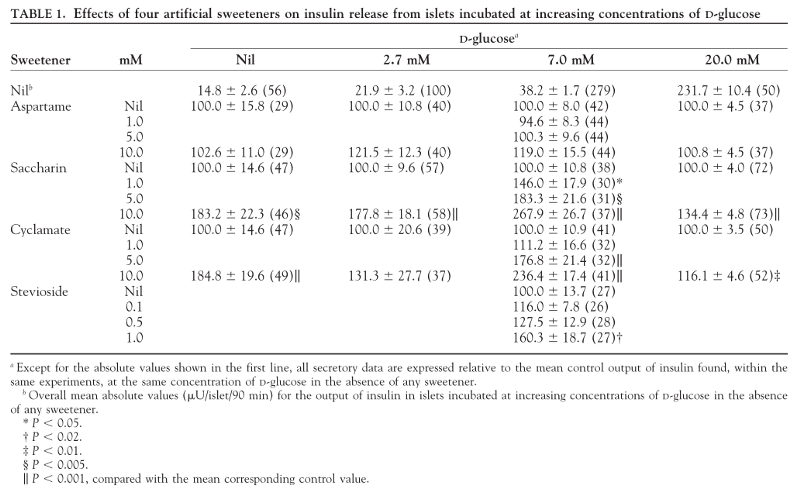
Curiously, in the above study, aspartame (one of the most popular NW) did not provoke insulin release by pancreatic cells, and insulinogenicity increased very modestly, unlike the study , the graphs from which I cited earlier. Well, maybe he has some additional molecular mechanism of insulin induction - for example, through its metabolites (after all, aspartame is a dipeptide that quickly splits in the stomach into compound amino acids). Moreover, there is evidence that aspartame does not enter the bloodstream at all, since it is completely broken down in the stomach (do not confuse Aspartam with its metabolite, the amino acid AspartaT ):
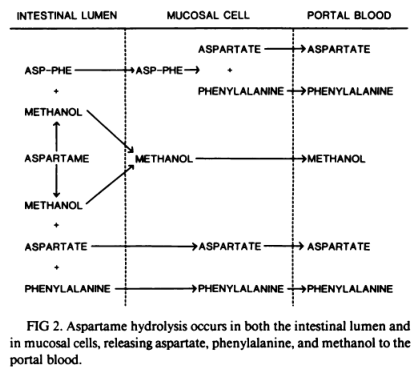
Therefore, cell experiments with aspartame itself, and not its metabolites, may be completely invalid.
Well, okay, we recognize that there is no complete clarity with the molecular mechanisms of insulin release and various NW, and set them aside. What is the correlation between NW consumption and various diseases? A lot of alarming bells. For example, here is a huge meta-analysis of dozens of different works, many of which show a correlation between NW and diabetes, but the researchers do not dare to conclude a clear conclusion.
But much bolder were the authors of a recent sensational work , which revealed a correlation between the consumption of beverages with NW and an increased risk of stroke and dementia. They argue that long-term daily consumption of at least one drink with NW correlates with a nearly threefold increase in the risk of these diseases:
After adjusting for age, gender, education (for analyzing dementia), calorie consumption, diet quality, physical activity, smoking, higher recent and higher cumulative consumption of artificially sweetened soft drinks was associated with an increased risk of ischemic stroke, dementia from all causes and Alzheimer's disease. Compared to the consumption of 0 drinks per week (baseline risk), the risk factors for high cumulative consumption of such drinks reached 2.96 (95% confidence interval, 1.26–6.97) for ischemic stroke and 2.89 (95% confidence interval, 1.18–7.07) for Alzheimer's disease. Sugar sweetened beverages were not associated with an increased risk of stroke or dementia.
Here is a very interesting schedule from there. Panel A presents the risk of stroke; Panel B presents dementia; The green curves are the group that did not drink beverages from NW, and the blue ones are the group that consumed them once a day or more often:
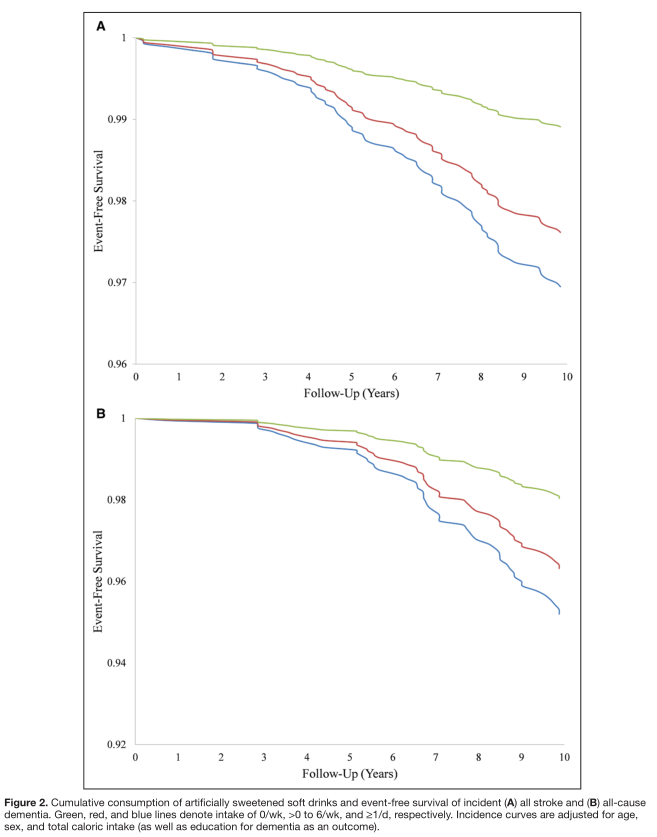
At the same time, the authors of this study stipulate that the inclusion of the diabetic status of patients in the model reduced the predictive accuracy of beverage consumption for the risk of dementia, but for me this is not surprising, since the correlation between diabetes and dementia has long been established, and I mentioned above the correlation between NW and diabetes.
Although it does not hurt to mention it again. This Harvard study found that consuming more than 4.5 drinks containing sugar per week increased the risk of diabetes by 25%, and the same consumption of drinks with sugar substitutes increased this risk by as much as 91%:
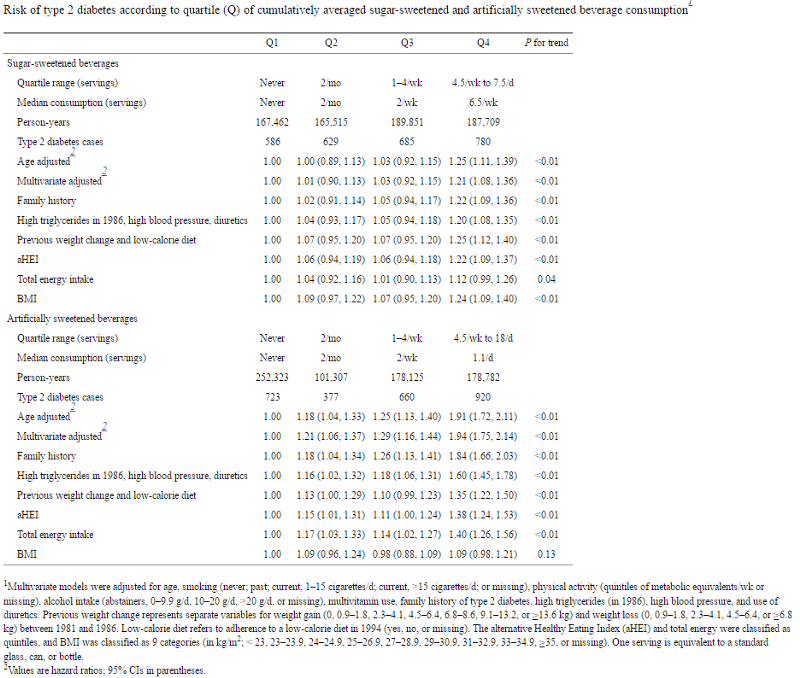
Similar observations were described in this Texas study : consuming more than one “diet” drink per day correlated with an increase in the risk of diabetes by 67%.
So it seems the safest thing to drink is Narzan. Although there are some rather strange experimental data from Palestinians from Ramallah about gas in drinks (there could be a joke about the fact that in Palestine, apparently, there are interruptions in non-carbonated water). Palestinians have shown that the level of ghrelin (“hunger hormone”) is significantly higher after consuming carbonated drinks (even water) than non-carbonated or degassed beverages. Like humans:
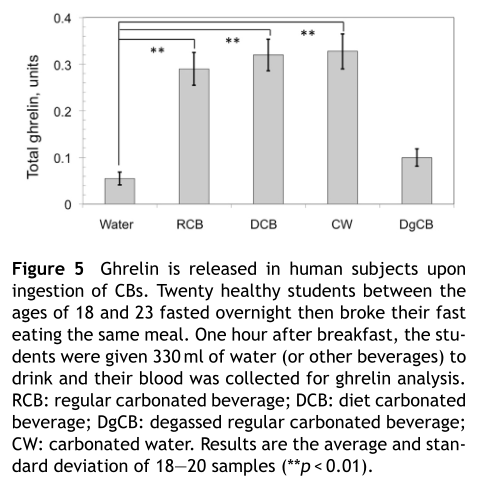
So in rats:
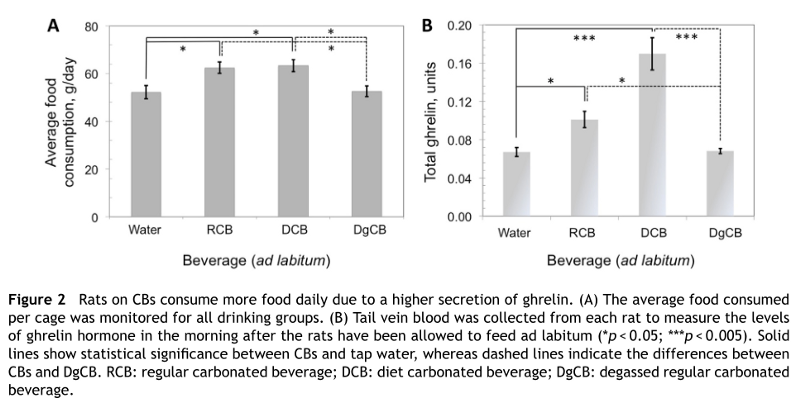
However, the fact that the authors do not know how to spell “ ad libitum” correctly undermines my trust in their conclusions. And even more it is undermined by another, Italian, study of 2011, in which scientists saw a completely different connection between soda and ghrelin. For some reason, they had a degassed dietetic Sprite leading to a higher level of ghrelin than the Sprite baseline or water:
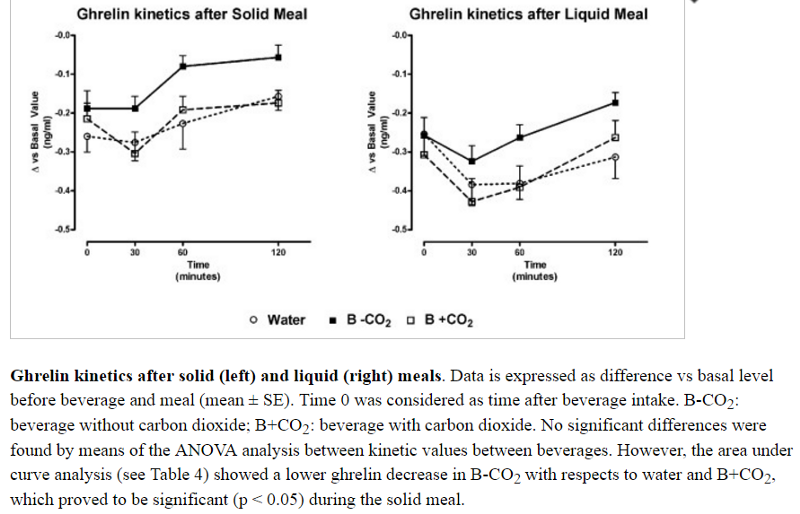
By the way, in my search for literature on the topic of carbonated drinks, I came across interesting data that carbonated water raises the pulse:
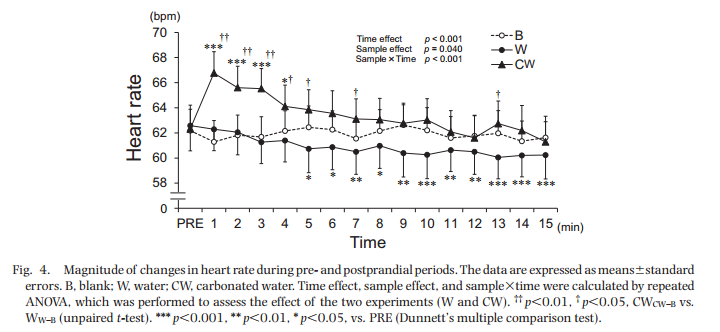
True, it does not increase much, and a similar effect is observed after ordinary food, but it is still curious that there is no such effect from ordinary, non-carbonated water. In any case, everything is quite ambiguous with gas in drinks, and for some reason there are very few studies of the influence of the carbonation of drinks on the body in Pubmed. It would be great if someone else conducted a study similar to the Palestinians, and checked their observations. In the end, such experiments cost a penny.
But on the sweeteners research more than enough. And even if the unequivocal verdict that they are even more evil than sugar, while no one decides to endure, in the framework of the logic of " Pascal's bet, " I would avoid them from sin away - it is better to err on the safe side.
All Articles